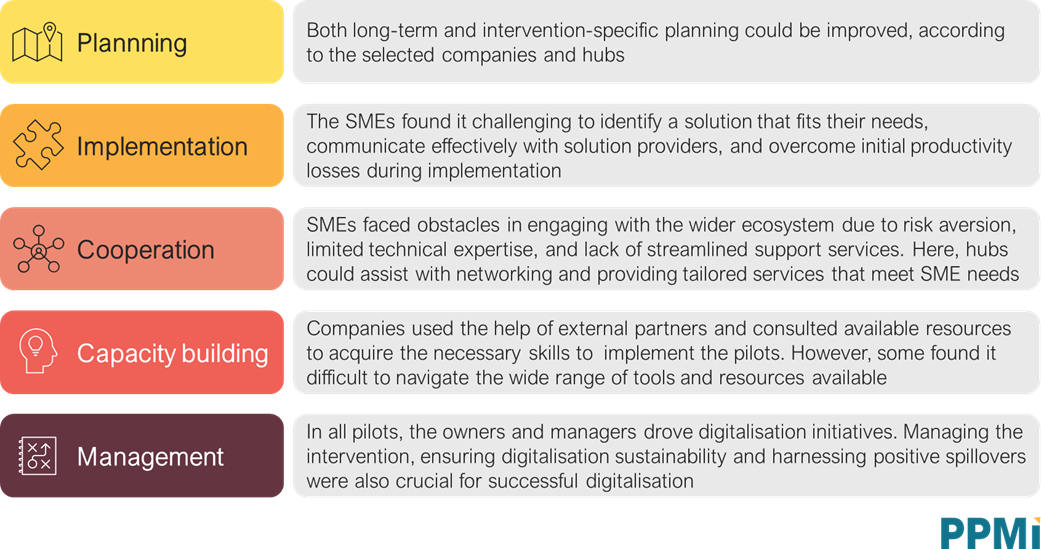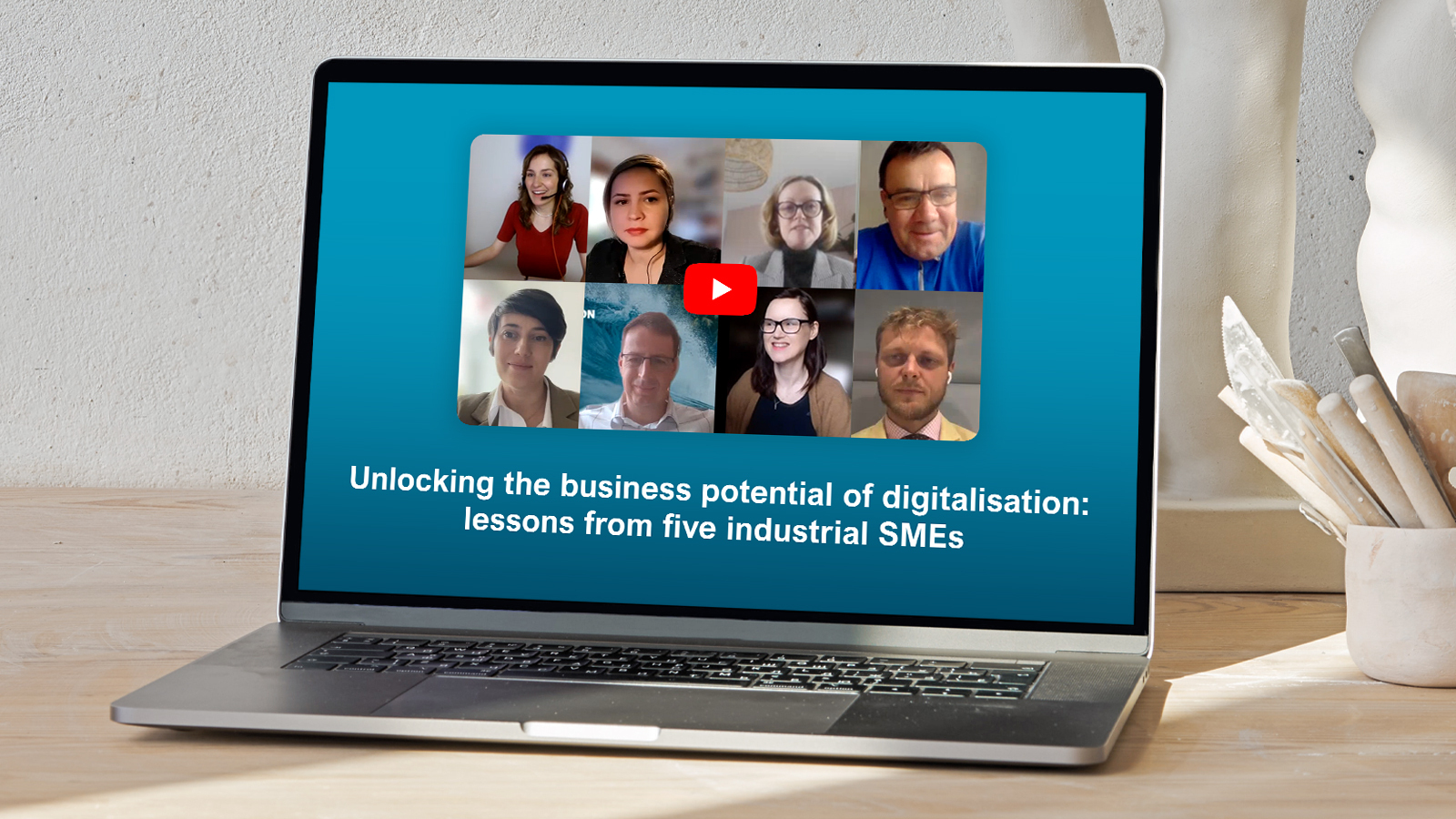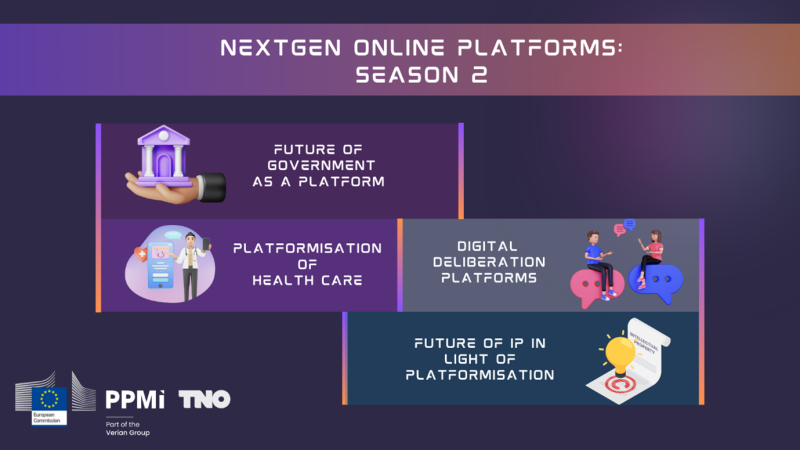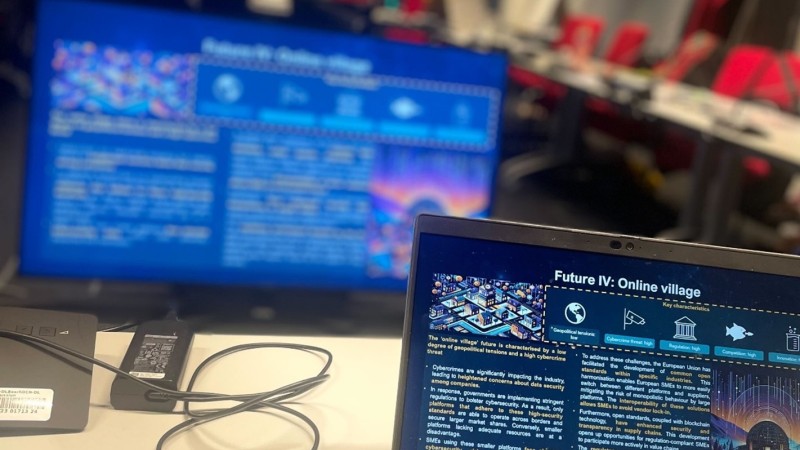On 26 April 2023, PPMI hosted the workshop 'Unlocking the business potential of digitalisation: lessons from five industrial SMEs', in collaboration with the European Commission.
During the past six months, PPMI and five Digital Innovation Hubs participating have been working closely with five industrial SMEs to pilot digital solutions as part of the Smart Industrial Remoting study. On 26 April the study team organised a workshop to present the findings of the digitalisation pilots. The event was attended by approximately 110 participants from over 20 countries, including representatives from businesses, (European) Digital Innovation Hubs, public sector organisations, research and academia.
Heidi Cigan, Senior Policy Officer at DG CNECT of the European Commission, opened the workshop. Barbora Kudzmanaitė, Research Manager at PPMI then introduced the five digitalisation pilots supported as a part of the study.
 Note: DMA score refers to the companies’ digital maturity based on the European Digital Innovation Hub digital maturity assessment.
Note: DMA score refers to the companies’ digital maturity based on the European Digital Innovation Hub digital maturity assessment.
Surfotekas' success story: a recipe for successful digitalisation
Next on the workshops’ agenda was a presentation of one of the pilots – Surfoteka’s introduction of a centralised, cloud-based system for integrating sales channels. Surfoteka is a retail company from Poland specialising in sports gear sales and maintenance.
Przemyslaw Kowalski, coordinator of the DIH4EU hub that supported the pilot, and Roman Budzinski, the owner of Surfoteka, presented the results of the digitalisation pilot.
Surfoteka implemented the pilot at a challenging time for the company. Surfoteka had recently experienced a fire at its main site, which destroyed its stocks and data servers. Rather than being discouraged by the incident, Roman Budzinski was inspired to double down on the company’s digitalisation efforts. According to Przemyslaw Kowalski, ‘this was the moment to rethink and redo everything that was not working in the company’.
Before implementing the digital solution, Surfoteka struggled with its sales channels and inventory management. The company's assortments were updated manually, customer orders were not synchronised with Surfoteka’s stock, and sales management was overly time-consuming.
To streamline its operations, Surfoteka decided to embrace digitalisation. The Digital Innovation Hub worked closely with Surfoteka to assess its needs, implement an appropriate digital solution and configure it to meet the company’s requirements. Przemyslaw emphasised that the hub prioritised ‘solving the real business problem’ over adopting the most advanced or cutting-edge technology, which was crucial to the success of the project.
'The most important thing is that our work is now simpler. For me, nice and quiet work is more important than profit, and the profit might come later.'
Roman Budzinski, CEO, Surfoteka
In the end, the digital solution proved to be a game-changer for Surfoteka. The software streamlined the purchasing process, improved customer communication and increased order processing efficiency. Roman expressed his satisfaction with the outcome, highlighting how the solution has made work easier as all tasks can now be completed via phone in real-time. Thanks to digitalisation, Surfoteka's customer management has improved, and daily operations have been simplified, resulting in a more streamlined and efficient business.
Digital Innovation Hubs can drive SME digitalisation through facilitating communication, sharing best practices and providing value-adding services
During the collaborative session, attendees joined breakout rooms to discuss overcoming barriers to digitalisation, successfully implementing digital solutions, and fostering collaboration with wider ecosystems.
Participants identified several ways in which hubs can support SMEs with digitalisation:
- Facilitating communication: hubs can help SMEs identify relevant technology providers, mediate communication between parties and help companies avoid vendor lock-in situations.
- Sharing best practices: knowledge-sharing between hubs and companies is vital in showcasing the benefits of digitalisation and (E)DIH services to SMEs. By sharing both good and bad practices, businesses can learn from one another's experiences.
- Providing value-adding services: companies want services that fit their specific business needs. By demonstrating how digital technologies can address these needs and bottlenecks, hubs can provide more value-added services to SMEs.
- Collaborating within the (E)DIH network: hubs can take advantage of the broader (E)DIH network to improve their services. Local hubs can act as one-stop shops for SMEs, connecting them to a network of hubs locally and internationally.
The collaborative session generated several highlights and valuable insights, which are summarised below.
 From planning to management: lessons learned from five SME pilots
From planning to management: lessons learned from five SME pilots
After the collaborative session, Rūta Gabaliņa, Senior Researcher at PPMI, shared the main insights gained from the five digitalisation pilots. Throughout the piloting phase, the study team gathered valuable information on the digitalisation process from the five SMEs involved. The study team then synthesised horizontal takeaways across five digitalisation processes, a summary of which is included below.
 The three C’s of trust: competence, consistency and communication
The three C’s of trust: competence, consistency and communication
The presentation was followed by a panel discussion on how SMEs and Digital Innovation Hubs can work together successfully. The discussion featured Irina Toma, Coordinator of FIT EDIH; Gabor Vicze, Partner & CEO of Innomine; and Anca Sandu, Managing Partner of UNITH2B. The discussion was moderated by Barbora Kudzmanaitė.
The panellists identified trust building as a key challenge for effective cooperation between hubs and companies. Gabor Vicze noted that ‘SMEs often believe that digitalisation is only beneficial for big and multinational companies, and not for them’. Hubs need to build trust by showcasing successful SME digitalisation examples and involving local opinion leaders. The panellists identified trust building as a key challenge for effective cooperation between hubs and companies.
Irina Toma shared that their hub built trust with UNITH2B by focusing on the company's needs and ensuring that they added value. Anca Sandu echoed this sentiment, stating that the hub's competence, consistent support, and effective communication encouraged her to further engage in the pilot.
'The three C’s – competence, consistency and communication – are key to building trust.'
Anca Sandu, Managing Partner, UNITH2B
The speakers also highlighted the importance of adapting hub services to SME needs. Irina Toma acknowledged that SMEs are highly diverse in terms of digital maturity, industry, and business models, and that hub services must be tailored to these differences. Gabor Vicze explained that SMEs do not always require cutting-edge technological solutions and that the solutions and services used by big companies often do not work for them. Instead, the hubs should offer simple and quick solutions that meet the business needs of SMEs and provide tangible results. Anca Sandu confirmed the value of the hub’s support in assessing her company’s needs and targeting specific processes that could be optimised.
The panellists also highlighted the crucial role of hubs in helping SMEs find funding. Irina Toma shared how most companies they work with are interested in funding and that many of them ‘would not be able to start interventions without it’. Gabor Vicze further explained SMEs seek funding not because they cannot afford digitalisation projects, but because funding helps reduce the risks associated with them. SMEs are more risk-averse than big companies as the cost of failure is significant for them. He suggested that smaller amounts of EU funding could be used to kick-start digitalisation projects, potentially offering a solution to this problem.
What’s next?
Keep an eye out for upcoming publications and events!
This workshop will be followed by a report describing the results of the five digitalisation pilots, a Digitalisation Toolbox and national dissemination events.
You can find out more about the study and access past publications here.
If you have questions for the team or wish to join our mailing list, you can always reach us at digital_industry@ppmi.lt.
The recording and the presentation from the workshop are available below.
Watch the separate recording of each session here.
Download the workshop slides.






